Distribution of software
Dual licensing policy
We provide a few samples of source codes accompanying some of our main publications. Most of
our source codes are distributed according to a dual licensing policy:
- a GNU GPL licence, freely
available and mainly targeted for academic researchers. Sharing software
resources to the research community indeed helps researchers conduct reliable benchmarking
work, and is also a way to mutualize efforts so as to build up better methods and systems. If
you sign up for a GPL license and modify or improve the code, we encourage you to distribute
your changes to the community. Note that according to the GPL licence, you are not
allowed to distribute a software based on the original code source or on any modified version of it, without distributing the
corresponding sources.
- a commercial proprietary licence, mainly targeted for people working in industry, and for
anybody who would like to have a different usage from the one that is required by the GPL
licence. If you are working for a private company, as long as you respect the terms of the
GPL and in particular do not need to sell nor distribute your software (depending on our
code) without distributing the source code, you may well use the free GPL license. Otherwise
you have to acquire a proprietary license. Furthermore, while this is not requested by
the GPL license, we strongly encourage you to acquire a commercial license if you plan a long-term project using our
code, even if this is for internal usage only and not to be integrated into a commercial
software. This way you will contribute to the research cost which, in our case, is mostly funded by public resources.
To get a commercial
license, please e-mail us (Florence (dot) Descoubes (at) inria.fr).
If you are using our source code for building some new public material such as a
research publication, a GPL source code, or results such as images or movies, please cite our work (by citing the paper which is related to the distributed software).
Of course, although we do not commit ourselves to maintain the code, we are happy to be
informed about where and how our work is being used. So please feel free to contact us and
provide us with feedback !
Source codes available for download (under
the GNU General Public License if not
mentioned otherwise)
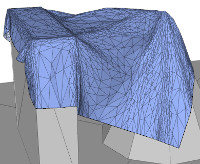
|
Argus-distribution,
simulating adaptive cloth dynamics with (nonsmooth) frictional contact.
This code is the reference implementation of our
adaptive cloth frictional contact paper.
Citation: Jie Li, Gilles Daviet, Rahul Narain, Florence Bertails-Descoubes, Matthew Overby,
George Brown, and Laurence Boissieux. An Implicit Frictional Contact Solver for Adaptive Cloth
Simulation, ACM SIGGRAPH 2018.
License: The Argus-distribution code acts as an open-source module which calls two external
open-source libraries, So-bogus and (a modified version
of) ARCSim. The two latter libraries use
different open-source licenses, please refer to the Argus-distribution LICENSE file for details).
|
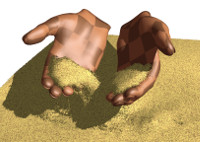
|
Sand6,
simulating granular material as a continuum medium with (nonsmooth) Drücker-Prager rheology.
This code is the reference implementation of our
semi-implicit MPM granular simulation paper.
Citation: Gilles Daviet and Florence Bertails-Descoubes, A Semi-Implicit Material Point Method for the Continuum Simulation of Granular Materials, ACM SIGGRAPH 2016.
|
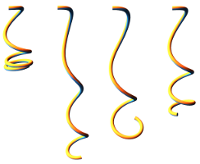
|
Cloc,
simulating the dynamics of arbitrary curly thin elastic rods.
This code is the reference implementation of our
Super Space Clothoids paper.
Citation: Romain Casati and Florence Bertails-Descoubes, Super Space Clothoids, ACM SIGGRAPH 2013.
|
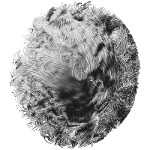
|
Approche, converting a
space curve into a smooth piecewise helix.
This code is the reference implementation of our 3D Floating Tangents
paper.
Citation: Alexandre Derouet-Jourdan, Florence Bertails-Descoubes, and Joëlle Thollot,
Floating Tangents for Approximating Spatial Curves with \(G^1\) Piecewise Helices, Computer-Aided
Geometric Design 2013.
Note: We have also been leveraging this code in our Inverse
Dynamic Hair Modeling paper to convert splines into the geometry of super-helices.
|
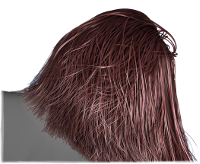
|
So-Bogus, a fast and
robust solver for capturing frictional contact between many Lagrangian systems with exact Coulomb
friction.
This code is a new reimplementation by Gilles Daviet
and serves as a reference code for
our Hybrid Iterative
Solver paper. The method significantly improves robustness and scaling up compared to Double Loop.
Citation: Gilles Daviet, Florence Bertails-Descoubes, and Laurence Boissieux, A Hybrid Iterative
Solver for Robustly Capturing Coulomb Friction in Hair Dynamics, ACM SIGGRAPH
Asia 2011.
Note: We have also been leveraging this code in our
Super Space Clothoids paper to simulate dry frictional contact, and in our
Inverse Dynamic Hair Modeling paper to efficiently solve the inverse problem formulated as a
large convex second-order cone
quadratic program (particular case of
the nonconvex frictional contact problem).
|
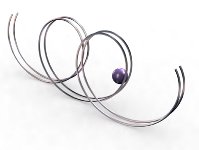
|
Double
Loop,
a simple Newton solver based on the Alart-Curnier formulation to capture frictional contact between
a few Lagrangian systems with exact
Coulomb friction.
This code is the reference implementation of
our
Nonsmooth Newton Solver for Fiber Assemblies paper.
Citations:
- Florence Bertails-Descoubes, Florent Cadoux, Gilles Daviet, and Vincent Acary, A
Nonsmooth Newton Solver for Capturing Exact Coulomb Friction in Fiber Assemblies, ACM
Transactions on Graphics 2011.
- Pierre Alart and Alain Curnier, A mixed formulation for frictional contact problems prone to
newton like solution methods, Computer Methods in Applied Engineering and Mechanics
1991.
Note: This code is easy to use and a full example with a colliding sphere is
provided. However, be aware that since then we have been much improving the robustness of this solver by
designing the Hybrid Iterative
Solver where a recent implementation is given by So-Bogus.
|
Authors
So far, people that have been involved in the design and development of the distributed codes
include Florent Cadoux, Romain Casati, Gilles Daviet, Alexandre Derouet-Jourdan, Jie Li, Rahul
Narain, Matthew Overby, George Brown, and Florence
Bertails-Descoubes.
Back to the main page.





